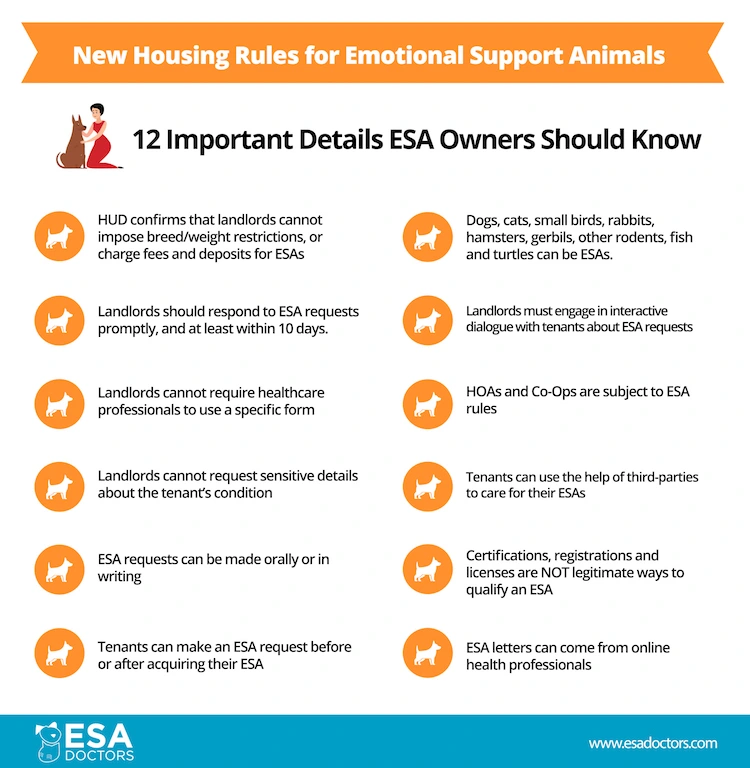According to a 2020 Harris Poll, about 30% of Americans are looking to move to less densely populated areas. Gone are the times when people flocked to the cities — the most coveted regions are now more suburban or rural. In 2020, about 5% of New Yorkers moved out of the city. Posh areas of NYC like SoHo and the Upper East Side lost 40% of their people.
This news might not be great for urban businesses, but it’s a dream come true for people who have emotional support dogs and want big yards and open spaces for their dogs to roam. However, people with emotional support animals (ESA) have extra work to do before moving. This article will outline some of the arrangements you’ll need to make before and after you move with your emotional support dog.
Have Your Emotional Support Dog Letter Ready
Your emotional support dog is a crucial part of your medical or psychological wellbeing, but you must prove the necessity of your emotional support animal. An ESA letter provides this documentation.
The ESA letter confirms that your dog is an ESA and not just a pet and therefore falls under the HUD Fair Housing Act (FHA). The ESA letter ensures that landlords adhere to the FHA. Under the FHA, landlords must let emotional support dogs reside with their owners, even in housing with a “no pets allowed” policy. ESA letters are written by a state-licensed mental healthcare professional and should include applicable dates and the professional’s signature and license number.
If you suffer from a mental health issue and would like to qualify for an Emotional Support Animal online, we can help connect you to a licensed therapist licensed for your state in the link below.
Inform Your New Landlord of Your Emotional Support Dog
Transparency is the best policy during your search for housing for you and your emotional support dog. Your ESA can reside with you by federal housing law, even if a housing complex has a dog breed or weight restriction or doesn’t allow pets altogether. Therefore, remaining honest about having an ESA from the beginning can prevent misunderstandings. It also ensures that landlords can make reasonable accommodations and help prepare for your stay.
Keep in mind that you’re not obligated to notify landlords or rental agencies that you have an ESA. You may sign your lease first, then later present your legitimate ESA letter. By federal law, the landlord can’t evict you or cancel the lease because of your legitimate ESA. However, submitting an ESA letter before signing ensures a more positive leasing experience.
Can a Landlord Demand Proof?
A landlord may not infringe on your privacy by inquiring about your medical or psychological condition. Overall, the ESA letter should be sufficient proof for a landlord to follow federal law. Some leasing agents or landlords may request their forms to be filled out in addition to receiving the ESA letter. Your licensed medical health professional who signed the ESA letter should be available to fill in any additional information needed; however, they will refrain from answering any questions that will breach the doctor-patient confidentiality.
Can My Landlord Charge Extra Fees?
A landlord can’t charge extra fees because of the presence of an emotional support animal. Charges that typically apply to pet fees or a security deposit increase because of your emotional support dog must be waived by law. No additional fees should occur because of your emotional support dog. However, any damages caused by the emotional support dog may be charged.
What Can I Do if I’m Denied Housing Because of My Emotional Support Dog?
If your emotional support dog proves to be a danger to others or causes the landlord undue financial hardship, a landlord has cause to ask for the removal of your dog. In that case, your landlord may have the grounds to evict you or refuse your emotional support dog. However, other than these reasons, a landlord can not deny your emotional support animal, as stated in the FHA. If you feel you’ve experienced discrimination, you can choose to file a complaint with HUD.
Choose to be Courteous
Moving is stressful and can cause both you and your emotional support dog some anxiety. Adding to explaining the laws to uninformed landlords can make the experience downright frustrating. No matter what happens, it’s always best to approach the event as both a learning and teaching moment.
You are learning how to navigate life with an emotional support animal and developing confidence in the process. You are also teaching others how essential emotional support animals are and how they are valid interventions for a person’s emotional or mental disorder. The more often landlords and the public are positively exposed to emotional support animals, the better their understanding will be of others with ESAs.
Get your ESA Letter before you move; Connect with a Licensed Health Care Professional now. (linked)












Leave a Comment